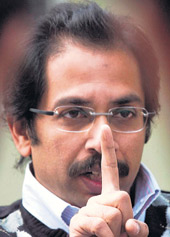 |
 |
| NO MALL ISSUE: Shiv Sena supporters protest in front of Big Bazaar in Mumbai recently. (Above) Uddhav Thackeray |
It’s official. The Sena has now reclaimed the Marathi manoos (which means man in Marathi) as their own. Two months ago, when Bal Thackeray’s party seemed to be in the doldrums, the natives rallied around it and voted overwhelmingly in its favour in the civic elections in Mumbai.
As a return gesture, the Shiv Sena has decided to once again take up the cause of the sons of the soil. On March 25, Uddhav Thackeray, scion of party chief Bal Thackeray, demanded that Marathi-speaking Maharashtrians from south central Mumbai who were displaced by the development of mill lands should be given jobs in the malls that have come up in their place.
Once a textile hub, south central Mumbai now swarms with shopping complexes, luxury apartments, malls, high-tech corporate offices and five star hotels. Two months ago, Century Mills, one of the last few surviving mills, shut shop.
Last Sunday, members of the Shiv Sena’s labour union Bhartiya Kamgar Sena (BKS) launched a protest outside three Big Bazaar outlets in Mumbai at the sacking of 120 probationary workers by the retail major — signifying that the Sena meant business.
But despite the Sena’s sons-of-the-soil posturing, some are sceptical of their real intent. Says Neera Adarkar, architect, researcher and urban activist with the Girni Kamgar Sangharsh Samiti, who has been at the forefront for the rights of mill workers of all hues (irrespective of whether they are Marathi-speaking or not), “The Shiv Sena in coalition with the BJP didn’t do much for the mill workers. In fact, the then Maharashtra government was busy modifying the Developmental Control rules to introduce construction on the mill lands.”
When the mill lands were sold, most workers got Rs 3.5 lakh as VRS. Ironically, Shiv Sena leader Manohar Joshi has also bought mill land for Rs 500 crore with Raj Thackeray. “I doubt if they will employ Marathi-speaking boys in the new economic zone created by them in the mill lands,” says a political observer.
“You need a certain skill set to work in malls and even the mill workers’ children realise that they don’t have it,” says Vaibhav Purandare, author of The Sena Story. Purandare feels that the whole issue is just a political gimmick. “After the civic elections the Sena has realised that Maharashtrian voters are loyal to them. I suspect that Uddhav Thackeray was trying to ensure that his rival Raj Thackery didn’t snatch the initiative from him as the latter was making noises about bashing up Biharis sometime back,” he says.
But Atul Takle, vice-president, corporate communications, Pantaloon (India) Retail, which runs the Big Bazaar chain, maintains that the retail industry can indeed ensure that 80 per cent of its workforce comprises Maharashtrians. Says he: “The retail industry has to hire locally. In our catchment areas, we need employees who will make customers comfortable. So in Thane, which is a Maharashtrian area, most of our employees are Maharashtrians. Everywhere in the state, 83 per cent of our employees are Maharashtrians (defined both as Maharashtrians and those who’ve been domiciled in the state for a certain number of years.)”
The Shiv Sena might, however, strike gold with this move to champion the cause of the mill workers since development versus displacement is becoming a burning issue all over the country. In the Sixties the party rose from the same sons of the soil platform. Says Prem Shukla, editor of Saamna, the Shiv Sena mouthpiece, “If the party had not spoken up on behalf of the Marathi man at the time, all the clerical jobs would have been gobbled up by the south Indians. It is thanks to Bal Thackeray that almost 85 per cent of the jobs in the government sector today are held by Marathi-speaking Maharashtrians.”
However, by the mid 90s, Bal Thackeray realised that he had flogged the sons-of-the-soil issue to its limit. So he switched to the Hindutva plank.
The fact that jobs for locals is once again being revived as an emotional issue is perhaps testimony to the fact that the Sena is running out of ideas to catch the imagination of its supporters.










